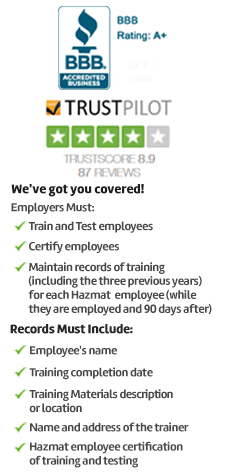
DOT HAZMAT Shipping Training

The 49 CFR 173.185 Online Training Certification course has been formulated to meet the growing demand for HSE professionals having expertise in safe handling and transportation of all kinds of Lithium Batteries.The course trains students to gain knowledge and skills and greater understanding of the regulations and safe practices with regard to shipment of lithium batteries.
Governing regulations
Students joining this course are trained for safe handling, packing and shipping of lithium and lithium-ion batteries following the rules and regulations put forth by the United States Department of Transportation (DOT). Different safety standards have been formulated for ground, air and vessel transport, respectively. 49 CFR 173.185 was originally documented by PHMSA to regulate shipping by land, air, or water in the United States. The legislation includes specific standards designed to remove mishandling and poor packaging of lithium batteries.
Course Overview
Lithium batteries are being extensively used by us in our cell phones, laptops, digital pacemakers, cameras, and much more. They are hugely popular because of their longer life span compared to standard alkaline batteries. While lithium batteries can make an easy power source for our electronic gadgets, it can pose a serious health and environmental hazard or life threat due to various reasons. So, it is important to understand and analyse risk factors involved in handling, using and transportation of lithium batteries. Having a thorough understanding of DOT standards will help minimize the associated risks involving shipping of lithium batteries.
Who Must Take this Course?
This course is made to help learners get better understanding of the standard rules and safe practices which are in place while transporting lithium batteries. Having good understanding of DOT standards for such processes will help reduce the associated hazards. Also, experience in using controls to reduce the risks linked to shipping of lithium batteries such as prescribed packing standards, will also aid safe work and travel environment. More so, following all relevant rules and regulations, such as record keeping, monitoring and reporting, will help safer transportation of hazardous materials such as lithium batteries.
Course Format
Our DOT Shipping Lithium Batteries course consists of study material, audios, graphics, self-assessment questions, and a final exam.
Continuing education credits?
Students will receive 0.2 CEUs (or 2 CMEs) on completion of the course.
Topics Covered
- About This Course
- Course Objectives
- Introduction to DOT Shipping Lithium Batteries Safety Training
- Governing Authorities
- Lithium Batteries – History
- Key Terms
- Purpose of the Law
- Recent Updates to the Regulations
- Battery Testing and Criteria
- Requirements of Part III, Sub-section 38.3
- Manufacturer Responsibilities
- Lithium Cell and Battery Requirements
- Packaging
- Avoiding Short Circuits
- Avoiding Movement of Batteries within the Packaging
- Key Takeaway
- Marking and Labeling
- Packaging Requirements Based on Size
- Size Definitions
- Small Lithium Batteries
- Medium Lithium Batteries
- Fully Regulated Lithium Batteries
- Exceptions for Smaller Cells
- Size Limitations
- Extended Maximum Sizes
- Packaging, Marking, and Documentation
- Packaging
- Marking
- Documentation
- Shipping for Disposal or Recycling
- Motor Vehicle Transportation Exceptions
- Low Production Runs and Prototypes
- Testing and Record-keeping Exceptions
- Damaged, Defective, and Recalled Batteries
- Transportation Stipulations
- Additional Resources
- Summary
- Exam

 NEBOSH CERTIFICATE
NEBOSH CERTIFICATE NEBOSH DIPLOMA
NEBOSH DIPLOMA IOSH
IOSH SAFETY DIPLOMA
SAFETY DIPLOMA CPD UK
CPD UK ROSPA UK
ROSPA UK FOOD SAFETY
FOOD SAFETY 



